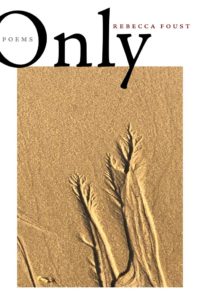 Review by Jennifer Pons
Review by Jennifer Pons
Rebecca Foust’s seventh book of poetry, entitled Only (2022), investigates the fleshy corporeality of woman, mother, and citizen. With accomplished craft, intelligence, and vision, the collection traverses the acts of remembering and reflection, revealing the universalities of what is at stake in the human story. Foust’s poems hover between worlds; they eclipse time and history, risking what is recollected and imagined to speak truth. Ultimately, these poems resonate and ascend as they wrestle with regret, grief, trauma, birth, love, and what is lonely, reaching toward what must ascend in hope when reality is both fact and question.
The book, separated into three sections, offers the reader a narrative frame to consider: a beginning (“Remember”), a mid-place (“Only”), and a turning into what must spill forth (“Watershed”). And while story threads interlock between individual poems and sections, what also presses and captivates is how each one makes its music, creating tension in the attentive ear. In this poem “Parts of Speech,” language and sound are buoyed by syntax and anaphora, distilling meaning, and intensity:
We came to a grove and you drew me in;
I wondered about our right to wander
where we would in the wood of old pine,
my hand in yours and yours in mine.
Fair was the raiment of cloud overhead.
or it was not fair, or it was just
beginning to clear. In truth all I saw
was your face and the white-capped cove,
and the old rowboat we dragged into shore.
In truth, there was no grove, no cove,
no clouds, no scow––the only sounds
being voice, face, and hands––or the pine
and the wood were just active and aching
verbs. Or, that is all I remember now. (10)
Foust’s language and lineation hover in observation and rumination but also, with skillful weaving, move the poem towards both lift and ground. In its commentary of body, place, parts, and what is or is not actual or imagined, the poem, like those throughout the collection, pierces what confesses memory, betraying an emotional landscape that begs for encounter and moves in its restraint.
While villanelles and sonnets surface throughout the three sections, further revealing Foust’s adroit craft, the poems also breathe in free verse. Here, they equally sing and illuminate through tonality and imagistic capture. The relationship between forms in the text creates a contending within that mirrors its subject matter. Thus, what is human and lived must be examined and considered with intellect and pulse. Still, whatever the shape as it relates to the page, these poems crush through their speaking. Foust balances restraint and candor in her verse with voice both translucent and precise:
thirteen and there was a boy, and I became
something salt and sweet
where my legs met. My heart like a bird
swelled and split
the clear air with its song. I was the must,
the first press wine (9)
The sensory and visceral allow for language and meaning to couple: something here both transports and traps. Foust’s poems reckon with reality, seeming to say that what is gathered and given voice can also take flight.
The desire for other imbues the text with expansiveness: “…tranced and speaking in tongues––I lived in a world traced by the footprints / of sparrows on snow / but narrated myself an English orphan with imaginary and very small friends…” (8). Whether for a lover, parent, child, creature, or Earth, the necessity to investigate human need and frailty with that which indicts and separates emerges again and again. Foust’s themes and language reach into the ether between those thin lines of what is mysterious and possible: “…but being alive means proving a negative. So how can / we go on believing each day won’t be the one…” (36). The poems in this collection call forth a sense of belonging. They ache, and something of the celestial rains down.
Erudite and elegantly crafted, Only captures that irrepressible wading through life with insight and measured maturity. Generously offering poems that resonate to both indict and heal, Foust compels the reader with a voice that persists in its provocation that we must do better in this time, this life, this earth, these bodies. The poems call forth the philosophical, but what is most poignant about this collection is how it perseveres with humility and tenderness while persisting in truth-telling and search. What speaks is neither faint nor cynical but instead swells with courage and sincerity.
Rebecca Foust has been published extensively in journals and anthologies. Some of her many recognitions include the 2019 Pablo Neruda Award, the 2018 CP Cavafy Award, and the 2015 James Hearst Poetry Prize. More about the author can be found at https://rebeccafoust.com/author.
Only by Rebecca Foust
Four Way Books, 2022, $17.95
ISBN 9781954245297
Jennifer Pons is a writer and educator in Portland, Oregon. Her poems appear in Ninth Letter (web edition), Mom Egg Review, Rock & Sling, Opt West, Psaltery & Lyre, CutBank Online, Across the Margin, Whale Road Review, and other publications. She was a finalist for the Patricia Goedicke Prize in Poetry (2020) and the Pamet River Prize (2020) and was nominated for inclusion in Best Spiritual Literature 2022.
